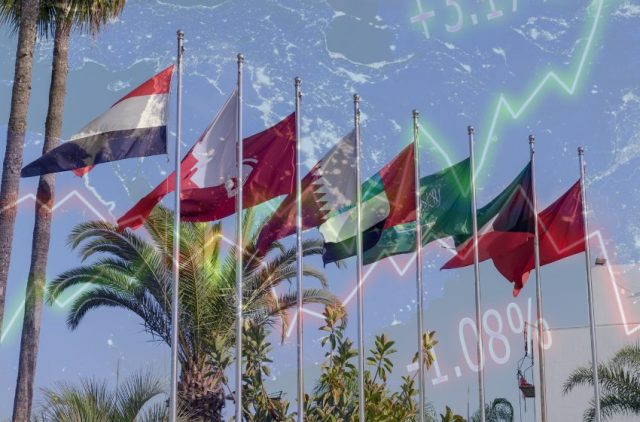Middle East Crisis: Risk Reallocation
By Daniel M.
April 15, 2024 • Fact checked by Dumb Little Man

The retraction of global markets recently is a strategic adjustment, responding to escalating conflicts in the Middle East that threaten to disrupt critical global supply chains. The primary concern now is the potential for a spike in oil prices, driven by tensions in the Strait of Hormuz—a crucial global shipping route.
The unrest in Oman, which borders this waterway, has prompted investors to accumulate oil reserves, anticipating possible disruptions.
This tension poses a greater risk to the global energy supply than the current Israel-Hamas conflict, which has not directly impacted major oil pipelines. The potential surge in oil prices could extend the current interest rate cycle in the U.S., affecting broader macroeconomic factors.
Significant geopolitical shifts are prompting a move towards deglobalization. Changes in global trade dynamics, evidenced by China’s economic strategy shifts post-COVID, Russia’s adjustments in Western trade policies, and Latin America’s nearshoring trends, highlight this shift.
Such trends are underscored by warnings from JP Morgan’s CEO, Jamie Dimon, about the potential long-term impacts on the global economy.
With ongoing inflationary pressures, central banks worldwide are reassessing the assets supporting their balance sheets. Notably, China’s exchange of US treasuries for gold helps maintain high real interest rates. This scenario has led investors to shift their focus towards traditionally lower-risk assets, including gold, finite commodities like oil, the US dollar, Japanese yen, and real estate.
Bitcoin has also emerged as an alternative, although its sensitivity to interest rate cycles poses challenges.
The defense sector may also see increased interest due to likely increases in military spending by various countries. While the human cost of the conflicts is profound and demands urgent action towards peace, from an investment perspective, it is crucial to maintain a calm and strategic approach.
The current situation suggests a need for risk rebalancing rather than a complete overhaul of investment portfolios.
Echoing Dimon’s insights, it’s vital for investors to not overestimate the immediate economic impacts of severe global events. Continual risk monitoring and management within one’s portfolio is essential for maintaining a robust and forward-looking investment strategy.
Our thoughts remain with everyone affected in Israel, hoping for a swift resolution that brings back peace and stability to the region.
Daniel M.
Daniel Moore is a seasoned trading analyst with over 20 years of experience navigating the ever-evolving financial landscape. Renowned for his unconventional yet effective approach, Daniel utilizes a blend of technical and fundamental analysis to identify hidden gems and craft winning trade strategies. He is a master at demystifying complex market data and translating it into actionable insights for traders of all experience levels.

